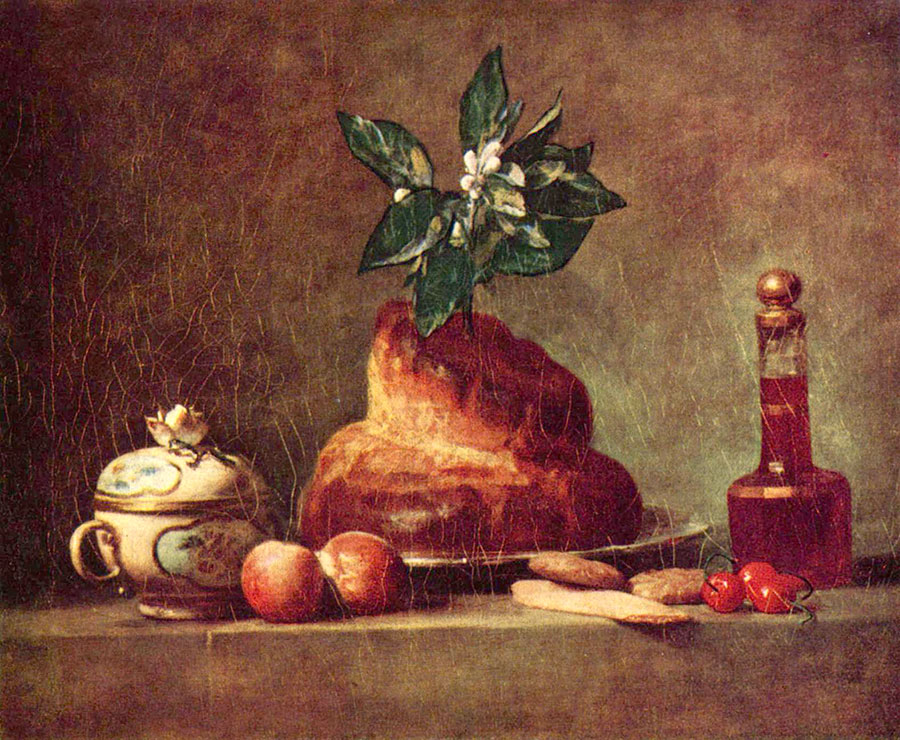March 2017
small talk
3 March 2017, around 18.25.
…when one is doing nothing it is imperative to talk all the time; and that is the most wearisome and the most dangerous of all forms of constraint. I will even go further and maintain that to make any society really pleasant, not only must everyone be doing something, but something that requires a certain degree of attention. Crochet is as bad as nothing; it takes as much to amuse a woman who is crocheting as one who is sitting with folded hands.
Citation (57)
5 March 2017, around 6.14.

[Mais aussi quand j’avais une fois ma chère petite brioche, et que, bien enfermé dans ma chambre, j’allais trouver ma bouteille au fond d’une armoire, quelles bonnes petites buvettes je faisais là tout seul en lisant quelques pages de roman !] Car lire en mangeant fut toujours ma fantaisie, au défaut d’un tête-à-tête : c’est le supplément de la société qui me manque. Je dévore alternativement une page et un morceau : c’est comme si mon livre dînait avec moi.
…it has always been a fancy of mine to read as I eat when I am on my own; it makes up for the lack of society. I devour a page and a mouthful alternately, and it is as if my book were dining with me.
- I omitted the translation for the part in brackets, naturally. [↩]
marginal
6 March 2017, around 5.19.

The other morning I started reading Judith Butler’s Giving an Account of Oneself; I think I meant it to be a tonic after reading the Confessions of J-J Rousseau, which I found – to put it mildly – tiresome.1 I was hoping its consideration of the ways in which one, as both writer and subject of personal narrative, is opaque to oneself would be helpful if not in making Rousseau a more sympathetic subject, at least appear more human. So far, however, its offerings at the altar of the World Spirit have proven more helpful in thinking about Jessa Crispin’s Why I Am Not a Feminist.
It was not the importance of social context, the heavy leaning on Foucault that made Butler’s book useful – no, rather it was this sentence: ‘I make eclectic use of various philosophers and critical theorists in this inquiry. Not all of these positions are compatible with one another, and I do not aim to synthesize them here’ (21). One is tempted to say that this eclecticism is sloppiness or an especially peculiar rhetorical strategy. Indeed, in Crispin’s book – which uses a similar device, though less explicitly – I thought it was the result of lazy editing. On further thought, however, it appears to get to the crux of the matter, which, in Why I Am Not a Feminist is twofold: first, advertising feminism does not in itself improve the lot of women because, second – to paraphrase Simone de Beauvoir – there is not a woman problem, but a capitalism problem. In short, the t-shirt with the catchy girl-power slogan does nothing to improve the lives of the folks who are underpaid to make it. So one must throw out everything – including every bit of deuced patriarchal rhetoric.
* * *
This is not what I want to say. I feel myself falling into the trap of other amateur critics of the book – of wanting to point out things that appear misguided only to find myself agreeing with them in part (note the dangers of attempting to answer an eclectic rhetoric). Most irritating of all in this most irritating of times is the suspicion that I cannot say anything about it at all, that I cannot think anything about it at all, that I can neither agree not disagree nor understand nor misunderstand because the nature of the work yokes these actions with a vision of how the world should work. It does not offer an explicit statement of that visions (beyond ‘better’), but points to the place to fall in line.
I’ve never much cared for that sort of thing – not because I march to the beat of a different drummer, but because I don’t much care for drums in the first place.
- In the course of ranting about the book, it was pointed out to me that the transparency of Rousseau’s prose – his ability to let the reader see that he is neurotic, obnoxious, and ungrateful (as well as just a generally unpleasant person as a whole) while protesting how others are insincere, mendacious, and out to get him – is a rare and powerful gift, and should be appreciated. I think I might work myself up to appreciate it, given time – and a different subject. [↩]
A view (47)
9 March 2017, around 15.53.

There is society, where none intrudes
By the deep Sea, and music in its roar… (etc)
